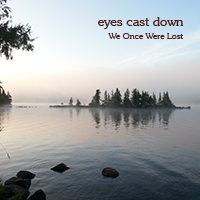
WE ONCE WERE LOST
eyes cast down
Kalindi Music KM006
Jan 27, 2020
| 1. | Abyssal | 28.43 |
| 2. | Aurora | 10.54 |
| 3. | Gypsy Girl in Paris | 10.28 |
| 4. | Confluence of Souls | 16.10 |
2020 begins with the first of two unexpected releases.
These four “lost pieces” were begun and set aside during 2005-11, and completed in Dec. 2019.
Abyssal began as a short, improvised synth jam from March 2005. I cherry-picked the good bits and set about reworking them into an Actual Composition. A good combination of NI Absynth & Camel Alchemy patches evoked the eerie, deep submersion I was looking for, and I ended up with an extended, live-recorded performance. I’m really looking forward to playing this in concert.
Aurora, made up entirely of 12-string guitar harmonics, had been completed, set aside for a future album and forgotten. It was recorded in 2010 and only needed some post-production adjustments.
Gypsy Girl in Paris was created for a remix project which never came to fruition, but I had always intended to use it myself. The original Marimba and Santur parts were recorded in 2011, and a synth frame was added in Dec. 2019.
Confluence of Souls had the most ambitious origin story: intended as a longform piece with voices and more, built on a foundation of guitar loops. The two guitars – recorded in 2007 – stood up nicely, with only a few brush strokes needed to complete it.
Big thanks to Diana and everyone at Radio Spiral for an anjoyable album premiere!
Review by Ron Schepper, Textura
Lost pieces to get lost in, as it were. The originating material on this sixty-seven-minute release from Evanston, Illinois-based Greg Moorcroft (aka eyes cast down) came into being between 2005 and 2011 but was only brought to a finished form last year. That collective pronoun in the album title doesn’t so much refer to people (although it could) so much as the four long-form soundscapes presented. And long-form they definitely are, with two checking in at ten minutes apiece and the others sixteen and twenty-nine.
The deepest dive arrives first in the form of “Abyssal,” a nearly half-hour epic of creeping ebb-and-flow Moorcroft developed from a 2005 synthesizer improvisation. After selecting about three minutes of material from that session, he extended it into the eerie soundscape presented on the release. Distant rumblings, shimmering resonances, and muted wailings pepper this live-recorded performance, all such details enhancing its seductive undertow—lights-out material in the truest sense. Here and elsewhere, the gear he used to generate the material—electric guitars (six- and twelve-string), synthesizers, and loops—creates a wash of sound where individual instrument timbres lose their identifying character as they melt into the whole.
Recorded in September 2010, the comparatively less unsettling “Aurora” opts for restrained painterly gestures, the sound design in this instance created from heavily processed twelve-string harmonics. As peaceful as it generally is, it perpetuates the ghostly ambiance of the opener, with the reverberant mass reflecting Moorcroft’s penchant for ethereal atmospherics; in contrast to “Abyssal,” however, guitar clearly stands out as an identifiable element in the plucks that recur throughout. While “Gypsy Girl in Paris,” which originated as a set of melodic sequences for piano and santur, immediately distances itself from the others in its animated rhythmic drive, the primary differentiating detail is the dulcimer-like character of the pattern powering the piece. As such, it’s almost impossible not to be reminded of Laraaji and something like “The Dance No. 2” from 1980’s Day of Radiance as its ten minutes unfold.
At recording’s end, “Confluence of Souls” reinstates the lulling drift of the opener for a quietly calming quarter-hour. Moorcroft initially planned it to be a minimal soundscape built on two guitar loops that begin at separate times and eventually synchronize, but after recording the loops in 2007 he set the piece aside. Resurrected, the spectral setting’s a natural fit for We Once Were Lost, especially when material of an ambient kind doesn’t show its age in the way a pop song, say, might. In addition to eyes cast down, Greg also issues material under the Mukunda’s Friends alias, a project more explicitly oriented around meditation principles. If eyes cast down isn’t as directly founded on that concept, the music on We Once Were Lost definitely qualifies as meditative music, or at least music ideally suited to help facilitate an equivalent state in the listener.